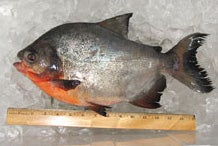You may have read about the invasive tegu lizard making its way up from Florida and now reports have surfaced of a native South American fish, the pacu, being caught in South Carolina’s Lake Hartwell.
When 15 year-old Drew Patrick, a resident of Anderson, reeled in the big fish, he thought it was a piranha. It was later identified as a pacu, which is a member of the piranha family, but not a flesh eating fish.
“When I first reeled it in next to my kayak, I saw the teeth and thought it was a piranha, but once we researched it and realized what it was, I was like, this is the catch of a lifetime,” Patrick said.
Pacus feed on plant material in the water and unlike the piranha, the teeth they sport are not pointed and sharp but rather squared off and look eerily more like human teeth than those of the monsters that terrorize in b-movies.

Like the tegu lizard, the pacu did not make its way from South America to South Carolina on its own. The fish caught by Patrick came from someone’s home aquarium.
People buy these fish when they are small and then are frustrated when the fish outgrow the tank. Rather than buy a larger tank or humanely kill the creature, they simply dump it into the waterways.
Aaron Connell, of Bob’s Tropical Fish on Riverwatch Parkway, says his company warns customers that some species may grow rapidly and urge them to bring the fish back for rehoming before dumping it in a lake.
“It’s actually common for people to bring them back if they can’t take care of them, and we always help rehome them,” Connell said.
While it is illegal to dump pacu into a lake, and they are considered invasive species, according to the South Carolina Department of Natural Resources, they are not anywhere near the nuisance as tegu lizards and the pythons taking over the Everglades in Florida.
The pacu could be a welcome species if only they ate hydrilla, an invasive marine plant that is choking up the local rivers and lakes, but according to National Geographic, hydrilla is not on the menu for pacus as they tend to eat algae as well as fruit and nuts that may fall from trees near the water.
Even though the pacu is not any kind of environmental threat, Ranger David Quebedeaux of the U.S. Army Corps of Engineers says that introducing fish such as the pacu or even goldfish in a lake still upsets the ecological balance.
“If they manage to survive and mate, then they are eating the food of native species and could crowd them out,” Quebedeaux said.
According to Quebedeaux, Clark Hill Lake has not experienced problems with non-native fish and says that the kudzu on land is a far bigger problem.
Meanwhile, Patrick has gained a bit of fame over his catch of a lifetime; however, the pacu he caught will not be making it to the family dinner table.
“I hear they taste really good, but I’m having this one mounted,” Patrick said.
Scott Hudson is the Senior Investigative Reporter and Editorial Page Editor for The Augusta Press. Reach him at scott@theaugustapress.com










